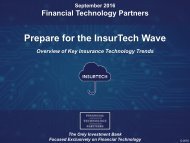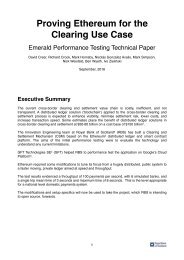Bitcoin and Cryptocurrency Technologies
1Qqc4BN
1Qqc4BN
Create successful ePaper yourself
Turn your PDF publications into a flip-book with our unique Google optimized e-Paper software.
7.5: Governments Notice <strong>Bitcoin</strong><br />
The rest of this chapter is about governments — government interaction with <strong>Bitcoin</strong> <strong>and</strong> attempts to<br />
regulate <strong>Bitcoin</strong>. Let’s start with the moment when governments noticed <strong>Bitcoin</strong>, that is, when <strong>Bitcoin</strong><br />
became a big enough phenomenon that government started to worry about the impact it might have<br />
<strong>and</strong> how to react to it. In this section <strong>and</strong> the next we’ll discuss why governments might worry about<br />
<strong>Bitcoin</strong> specifically. Then in Section 7.7 we’ll turn to areas where <strong>Bitcoin</strong> businesses may be regulated<br />
for similar reasons as other types of businesses. Finally in Section 7.8 we’ll look at a case study of a<br />
proposed regulation that combines elements of regular consumer financial protection with<br />
<strong>Bitcoin</strong>‐specific aspects.<br />
Capital controls.One reason why governments would notice a digital currency like <strong>Bitcoin</strong> is that<br />
untraceable digital cash, if it exists, defeats capital controls. Capital controls are rules or laws that a<br />
country has in place that are designed to limit the flow of capital (money <strong>and</strong> other assets) into or out<br />
of the country. By putting controls on banks, investments, <strong>and</strong> so on, the country can try to regulate<br />
these flows.<br />
<strong>Bitcoin</strong> is a very easy way, under some circumstances, to defeat capital controls. Someone can simply<br />
buy bitcoins with capital inside the country, transmit those bitcoins outside the country electronically,<br />
<strong>and</strong> then trade them for capital or wealth outside the country. That would let them move capital or<br />
wealth from inside to outside <strong>and</strong> similarly they can move capital from outside to inside. Because<br />
wealth in this electronic form can move so easily across borders <strong>and</strong> can't really be controlled, a<br />
government that wants to enforce capital controls in a world with <strong>Bitcoin</strong> has to try to disconnect the<br />
<strong>Bitcoin</strong> world from the local fiat currency banking system. That would make it infeasible for someone<br />
to turn large amounts of local currency into <strong>Bitcoin</strong>, or large amounts of <strong>Bitcoin</strong> into local currency.<br />
We have indeed seen countries trying protect their capital controls do exactly that, with China being a<br />
notable example. China has engaged in increasingly strong measures to try to disconnect bitcoins<br />
from the Chinese fiat currency banking system by preventing business from exchanging bitcoins for<br />
yuan.<br />
Crime.Another reason governments might worry about untraceable digital cash is that it makes<br />
certain kinds of crimes easier — in particular, crimes like kidnapping <strong>and</strong> extortion that involve the<br />
payment of a ransom. Those crimes become easier when payment can be done at a distance <strong>and</strong><br />
anonymously.<br />
Law enforcement against kidnappers, for example, often has relied upon exploiting the h<strong>and</strong>‐off of<br />
money from the victim or the victim’s family to the criminals. When that can be done at a distance in<br />
an anonymous way, it becomes much harder for law enforcement to follow the money. Another<br />
example: the “CryptoLocker” malware encrypts victims’ files <strong>and</strong> dem<strong>and</strong>s ransom in <strong>Bitcoin</strong> (or other<br />
types of electronic money) to decrypt them. So the crime <strong>and</strong> the payment are both carried out at a<br />
distance. Similarly, tax evasion becomes easier when it's easier for people to move money around <strong>and</strong><br />
to engage in transactions that are not easily tied to a particular individual or identity. Finally, the sale<br />
204









